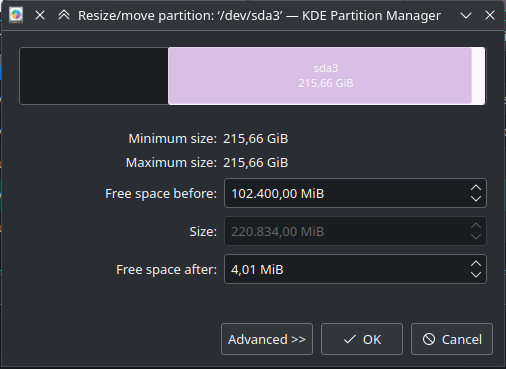You can only extend at the end. You would need to move it first.
but why isn't it giving me the possibility to extend it to the right by 4.01 Mb then?
4.01Mb may be too small for a single block.
I don't have a FAT32 partition available at hand to test this out, but couldn't you first move the partition to the left, and then extend it? Because IIRC FAT in general whines if you change its starting point, so you need to actually tell it "move yourself, you fat32ass!".
Also note that, for most purposes, you'd be better off with NTFS than FAT32.
thanks for the reply! I'll try to move it then. But without moving it, shouldn't I be able to extend it right by 4.01Mb?
IIRC FAT in general whines if you change its starting point, so you need to actually tell it “move yourself, you fat32ass!”
XD
Also note that, for most purposes, you’d be better off with NTFS than FAT32.
Why this? isn't NTFS primary a windows partition type?
Why this? isn’t NTFS primary a windows partition type?
Because FAT32 has a 4GB file size limit, it's generally slower, and it's easier for hardware faults to corrupt files in a FAT32 filesystem.
Usually I wouldn't bother with FAT32 unless some device specifically requires it, but this is uncommon nowadays. (Be sure to check it out first though, just in case, before ever thinking about changing filesystems!) And nowadays, even if NTFS was originally a Windows partition type (and FAT32 a DOS/W9x one), Linux has excellent support for both, both writing and accessing.
But without moving it, shouldn’t I be able to extend it right by 4.01Mb?
It's probably aligning the round edge to the hardware. Odds are that you can turn this off (in gparted you can), check if there isn't something about this in "Advanced >>".
Either way, I wouldn't worry too much. It's just 4MB.
thanks! What about exfat?
I don't know much about exFAT, besides the fact that it's encumbered by Microsoft patents.
I believe Microsoft published the spec and opened up the patents for exfat a while ago. So Linux has had a pretty good exfat driver from Samsung since Kernel 5.7.
Thanks for the info - as I mentioned, I don't know much about it. And frankly I never saw a point on using it, I usually go with ext4 > NTFS > FAT32.
I have an mid 2000's car stereo with USB support that only supports fat32
Cases like this are why I told OP to check it out first, just in case. Or why I said that devices requiring it are uncommon, not non-existent.
isn’t NTFS primary a windows partition type?
So is FAT32. Only FAT32 is more primitive and its origins trace back to a time long before Windows when DOS was still the primary MS OS.
I don’t think you can extend a partition at the beginning, only the end of the partition. This is because the partition header and table is written at the beginning of the partition (i.e. the file system needs to know where to start reading so that it can traverse files and directories in the partition). To support resizing a partition at the beginning data would have to be moved to the new beginning of the partition, and exactly which data needs to be copied differs from file system to file system so it’s not something supported by a partition manager such as KDE partition manager. Therefore, the only way to do what you want is to backup the partition, delete it, and create a new partition at the beginning of the drive and the restore the contents of the partition.
Extending a partition at the end is much simpler, basically some header just gets updated and says this is the new end of the partition, and then a file system specific command lets the files system know that you now have all of this free space available for use.
I'm hoping not to be forced to format it... but why isn't it making me extend the partition at the end, using the 4.01Mb unallocated space?
Depending on the block size the filesystem may not be able to use that 4.01Mb of unallocated space. There’s always wasted space with any file system because they have to make a trade off between making use of the available space and fast access.
thanks for the reply! I'll try to move it first then
Linux
From Wikipedia, the free encyclopedia
Linux is a family of open source Unix-like operating systems based on the Linux kernel, an operating system kernel first released on September 17, 1991 by Linus Torvalds. Linux is typically packaged in a Linux distribution (or distro for short).
Distributions include the Linux kernel and supporting system software and libraries, many of which are provided by the GNU Project. Many Linux distributions use the word "Linux" in their name, but the Free Software Foundation uses the name GNU/Linux to emphasize the importance of GNU software, causing some controversy.
Rules
- Posts must be relevant to operating systems running the Linux kernel. GNU/Linux or otherwise.
- No misinformation
- No NSFW content
- No hate speech, bigotry, etc
Related Communities
Community icon by Alpár-Etele Méder, licensed under CC BY 3.0
